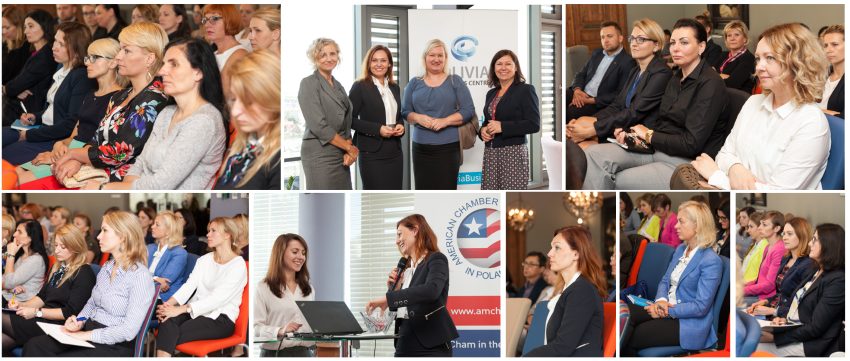Interview with Magdalena Bączyk Manager | Human Capital, Deloitte Advisory Sp. Ltd.
We live in a world of constant change and development, on an unprecedented scale, of the relationship between man and new technologies. The latter fill almost every element of our lives. Technological progress has reached an unprecedented pace. Artificial intelligence, mobile platforms, and social collaboration systems have revolutionized our lives, including work. People are good at adopting new technologies, but business is doing so to a much lesser extent.
According to a study by the consulting firm Deloitte, Organizations around the world are embracing technology to meet the growing demands of their employees, who are beginning to be treated as customers. In this respect, Polish HR systems remain… behind.
Although one of the most important priorities for companies in Poland is to attract the most talented employees, as many as 62 per cent of respondents believe that they are in the right place. of them admit that they are unprepared for it. The new era, often referred to as the Fourth Industrial Revolution or the term “Big Shift” we coin, means radical changes in business, the wider economy and society. In this pivotal era, top executives, both in business and HR, are under intense pressure to reinvent the principles of organization, recruitment, development, management, and engagement for the 21st century.
As part of the business breakfast organized by the American Chamber of Commerce Poland entitled “HR Trends 2017. Changing the rules in the digital era”, which took place on 11 September this year. in Olivia Sky Club, the above-mentioned report was presented to the Tri-City HR community.
We invite you to read the interview with Magdalena Bączyk, an expert from Delloitte, who presented during the above-mentioned meetings, main theses and results of the report.
Download the report (PDF, 39.5 MB) HR Trends 2017
–/–
Monika Bogdanowicz (Communication Olivia Business Centre): The way the world’s most efficient companies do business today is radically different from what it was 10 years ago. Many companies, however, still operate according to models from 100 years ago. They are burdened by outdated practices, systems, and behaviors that are difficult to abandon. How does this situation affect the opportunities for change, and what is necessary for organizations to be ready to keep pace with the technological revolution?
 Magdalena Bączyk, Manager | Human Capital, Deloitte Advisory Sp. Ltd.: The main observation from our survey this year HR Trends is that for the first time, CEOs and HR leaders are speaking in unison: The way we used to organize workplaces and understand what work is in general has changed. Organizations are moving away from rigid divisions into divisions and departments – we work in project teams composed of people with different competences, appointed for the time necessary to perform a specific task. Teams no longer communicate primarily by email – they use collaboration platforms such as Slack or Basecamp to do so. Not all team members are full-time employees – we have subcontractors, freelancers, crowdsourcing platforms. Finally, we have robots that take over some of the work previously done by humans. But it’s not teams or even robots that make it possible for us to talk about a revolution in the world of work.
Magdalena Bączyk, Manager | Human Capital, Deloitte Advisory Sp. Ltd.: The main observation from our survey this year HR Trends is that for the first time, CEOs and HR leaders are speaking in unison: The way we used to organize workplaces and understand what work is in general has changed. Organizations are moving away from rigid divisions into divisions and departments – we work in project teams composed of people with different competences, appointed for the time necessary to perform a specific task. Teams no longer communicate primarily by email – they use collaboration platforms such as Slack or Basecamp to do so. Not all team members are full-time employees – we have subcontractors, freelancers, crowdsourcing platforms. Finally, we have robots that take over some of the work previously done by humans. But it’s not teams or even robots that make it possible for us to talk about a revolution in the world of work.
The revolution is driven by a seemingly innocuous statement that resonated clearly in this year’s survey: we must treat employees as our customers. Therefore, we ask employees about their needs just as we study the needs of customers. On the basis of the information obtained, we adapt all processes, work organization and communication to individual employee segments, just as we adapt communication and offer to customer segments. Treating an employee as a customer is a trend that ranked 4th in terms of importance in this year’s survey. What is already a standard in marketing departments is slowly moving to HR departments.
MB.: So what are the main global trends in HR, and how do they compare to the conclusions drawn from the analysis of the Polish results of the report?
Magdalena Bączyk: Compared to global results, in Poland, the trend of building the organization of the future, which is number one on an international scale, turned out to be much less important, taking the fifth place among the priorities of HR leaders. It was overtaken by issues related to the career and education of employees as well as talent acquisition, which took first and second place in Poland, respectively. This may indicate that in Poland we have a more reactive approach to human capital management than in other countries, focusing mainly on the current difficulties related to the shortage of employees with the desired qualifications and competences. Such an attitude can be explained by the fact that in our region, significant talent shortages, affecting almost all industries and types and levels of positions, are a relatively new phenomenon if we take into account its scale. Nevertheless, the comparison of Polish and global results shows that, apart from the above-mentioned difference, the thinking of our leaders about the future of HR does not differ significantly from the views expressed by leaders from other countries.
This can be seen primarily in the results related to shaping the employee experience and the need to change the approach to performance management – Polish leaders are looking closely at these areas and taking action. 60% of the surveyed organizations in Poland declare that they have implemented some elements or a full strategy for building employee experience, and 61% are implementing changes in performance management systems, including a greater emphasis on strengthening employee strengths and coaching. In this respect, the level of advancement of Polish enterprises is the same, or even slightly higher, than the level of advancement of companies in global terms. 
MB.: In the context of the technological revolution, and above all in connection with the development of machine intelligence and its impact on the work environment, it is worth asking about the level of awareness of leaders in terms of the importance of the U.S. place and role… companies of the future.
Magdalena Bączyk: 31% of this year’s survey respondents said that they are in the process of implementing artificial intelligence and robotics systems, and 34% are at the stage of pilot programs in selected areas. And 10% say they are already fully automated or have achieved a significant degree of automation. Interestingly, when asked about the effects of the implemented solutions, only 20% of respondents predict a decrease in the number of jobs. As many as 77% intend to transform their existing positions so that employees can take advantage of new technology solutions and focus more on typical human skills such as problem-solving and decision-making.
MB.: So we have optimistic information! People will be the best and irreplaceable in their main roles in business development.
Magdalena Bączyk: Yes, everything points to it.
–/–
Magdalena Bączyk is a manager from the Human Capital Advisory team at Deloitte. He has over 7 years of experience in consulting in the field of human resources management. He specializes in the implementation of projects in the area of change management (both technological and organizational), transformation of HR functions, optimization of organizational structures, design and implementation of competency models, development of talent development programs, leadership development programs and design of management by objectives systems. She is a graduate of management at the University of Warsaw.
The report “HR Trends 2017. Changing the rules in the digital era” is one of Deloitte’s most extensive research efforts on talent, leadership, and the challenges facing HR departments in the era of technological revolution.




